

BPS cyberpsychologists say being active on social media will help you cope with isolation. The Big Bang Theory - The Friendship Algorithm. Google. 360 Link. 360 Link. Big Five personality theory. By Dr.
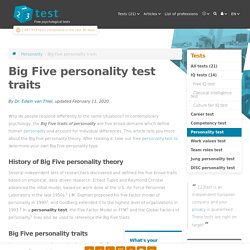
Edwin van Thiel, updated February 11, 2020 Why do people respond differently to the same situations? In contemporary psychology, the Big Five traits of personality are five broad domains which define human personality and account for individual differences. This article tells you more about the Big Five personality theory. After reading it, take our free personality test to determine your own Big Five personality type. History of Big Five personality theory Several independent sets of researchers discovered and defined the five broad traits based on empirical, data-driven research.
Big Five personality traits. Ben's suicide after school bus bullying sparks father's investigation and c...: West Suffolk College Library. AN EXAMINATION OF THE PREDICTIVE FACTORS OF CYBERBULLYING IN ADOLESCENTS.: West Suffolk College Library. Madeleine McCann's parents Kate and Gerry suffer online abuse on tenth anniversary of her disappearance. Madeleine McCann’s parents are still facing a daily barrage of online abuse, 10 years to the day after their daughter’s disappearance.
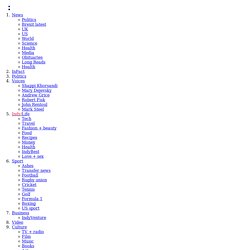
Social media criticism of Kate and Gerry McCann, posted on the 10th anniversary of their three-year-old daughter going missing in Praia da Luz, Portugal, has included calls for them to be charged with child neglect, and unsubstantiated allegations that they accidentally killed Madeleine. In apparent references to the fact that Madeleine went missing from the family’s holiday apartment while her mother and father dined at a tapas restaurant 50 yards away, successive twitter users have called the McCanns “vile”, “negligent” parents who “have only themselves to blame”. Can any good come from engaging with internet trolls? Q: Should I ever engage with my trolls?
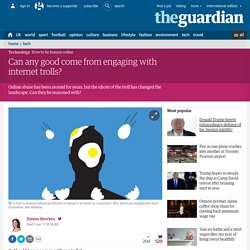
A: Firstly, let’s settle on a definition of “troll”. A troll is not someone who makes you feel bad. It’s not someone whose opinion you find offensive, or a “devil’s advocate” who assumes a position contrary to your own with the intention of stirring up trouble. That person, while annoying, is called an opinion writer and can still be usefully engaged with.
A troll, on the other hand, is someone whose gratification is vested in an intent to cause harm. Well, a few reasons. Mary Beard reveals she befriended Twitter trolls following online abuse. Academic and TV historian Mary Beard has disclosed her innovative approach to dealing with her vitriolic Twitter trolls – writing them a job reference.
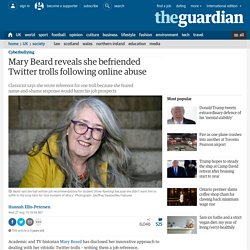
The Cambridge University professor, one of the country's foremost classicists who has fought a very public battle about online etiquette after receiving a torrent of abuse on Twitter, said she has taken to befriending her vilifiers. They include the university student Oliver Rawlings, whom she publicly named and shamed in July last year after he sent her an abusive message. Speaking in an interview with the New Yorker magazine, Beard revealed the pair had remained in touch after he took her to lunch to apologise for sending her a tweet that read: "You filthy old slut" followed by a derogatory comment about her genitalia. Beard retweeted it to her 47,000 followers to out her abuser, but said she had now taken to writing job recommendations for Rawlings so he didn't suffer in the long term for "one moment of idiocy". 1 s2.0 S1054139X12004132 main. Cyberbullying, School Bullying, and Psychological Distress: A Regional Census of High School Students.
EBSCO Publishing Service Selection Page. Andrew Blum: What is the Internet, really? Tim Berners-Lee: A Magna Carta for the web. Andrew Blum: What is the Internet, really? Jill Cockman. Personality Expression and Impression Formation in Online Social Networks: ...: West Suffolk College Library. Social and Technological Motivations for Online Photo Sharing.: West Suffolk College Library. Instagram guide. WhatsApp: a guide for parents and carers. What is WhatsApp?
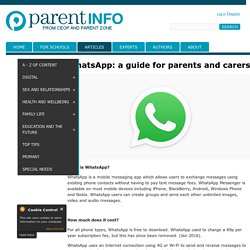
WhatsApp is a mobile messaging app which allows users to exchange messages using existing phone contacts without having to pay text message fees. WhatsApp Messenger is available on most mobile devices including iPhone, BlackBerry, Android, Windows Phone and Nokia. WhatsApp users can create groups and send each other unlimited images, video and audio messages. How much does it cost? For all phone types, WhatsApp is free to download. WhatsApp uses an Internet connection using 4G or Wi-Fi to send and receive messages to your contacts. Comparing Facebook Users and Facebook Non-Users: Relationship between Perso...: West Suffolk College Library. Psychological impact of social networking sites.: West Suffolk College Library. Aversive Peer Experiences on Social Networking Sites: Development of the So...: West Suffolk College Library. EU's right to be forgotten: Guardian articles have been hidden by Google. When you Google someone from within the EU, you no longer see what the search giant thinks is the most important and relevant information about an individual.
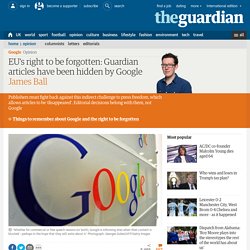
You see the most important information the target of your search is not trying to hide. Stark evidence of this fact, the result of a European court ruling that individuals had the right to remove material about themselves from search engine results, arrived in the Guardian's inbox this morning, in the form of an automated notification that six Guardian articles have been scrubbed from search results. Modern Family Episode Filmed Entire On Mobile Apple Devices: Sneak Peek. ISOC History of the Internet 1997. Tim Berners-Lee on the future of the web: 'The system is failing' Sir Tim Berners-Lee’s optimism about the future of the web is starting to wane in the face of a “nasty storm” of issues including the rollback of net neutrality protections, the proliferation of fake news, propaganda and the web’s increasing polarisation.

The inventor of the world wide web always maintained his creation was a reflection of humanity – the good, the bad and the ugly. But Berners-Lee’s vision for an “open platform that allows anyone to share information, access opportunities and collaborate across geographical boundaries” has been challenged by increasingly powerful digital gatekeepers whose algorithms can be weaponised by master manipulators. “I’m still an optimist, but an optimist standing at the top of the hill with a nasty storm blowing in my face, hanging on to a fence,” said the British computer scientist. “We have to grit our teeth and hang on to the fence and not take it for granted that the web will lead us to wonderful things,” he said. “The system is failing.